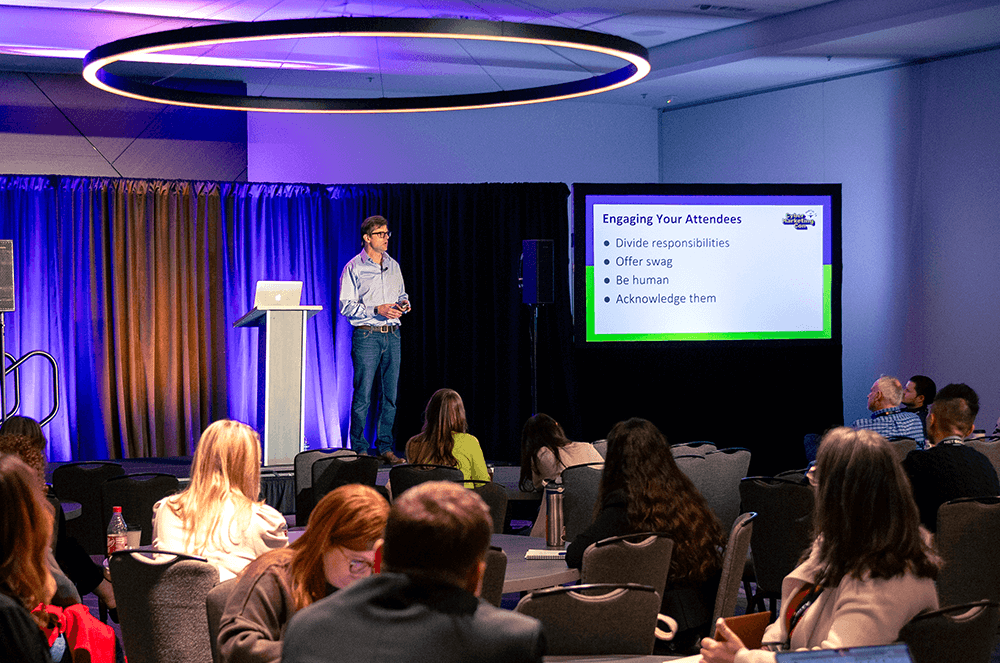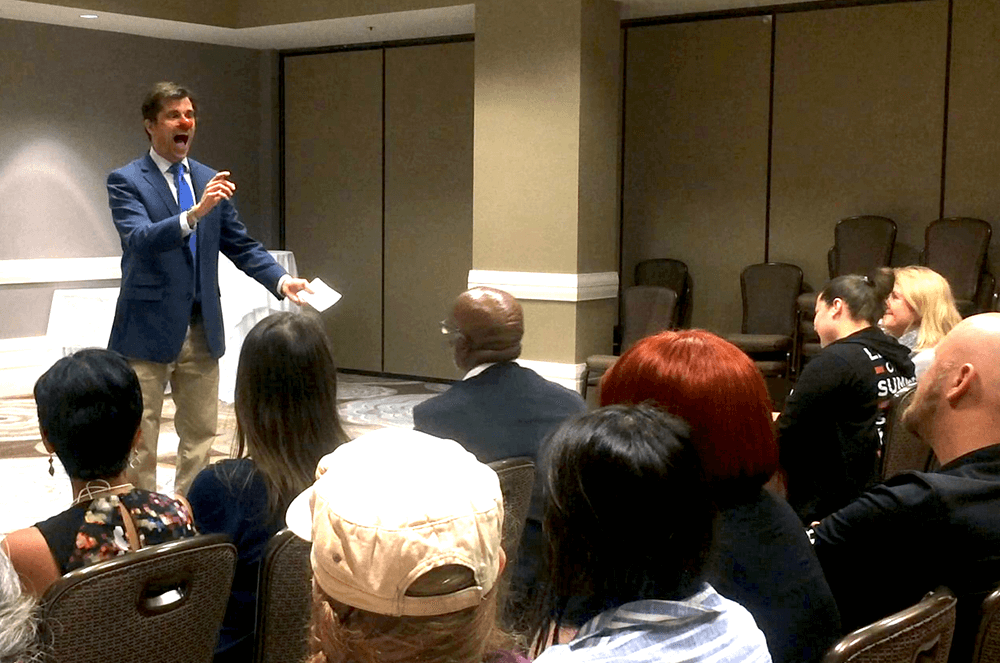
I stepped off the stage in disbelief as the crowd roared. I had just taken first place in the final round of the 2017 District 1 Tall Tales Speech Contest with my speech, “Matt the I.T. Guy.” I wondered how I, a lifelong perfectionist, could possibly have made it all the way to the top. I thought back to the painful video self-evaluations, the cringe-inducing Ah-Counter reports, and the constant self-doubt I had faced as I competed in my club, Area, and Division contests. I realized that the contest process had required me to face my perfectionism head-on.
Fellow perfectionists, have you found that your need to be perfect has drastically slowed down your Toastmasters progress? You’re not alone. While I can’t say I’ve left perfectionism behind, my Tall Tales journey has revealed some actionable insights that you too can use to overcome the perfectionism holding you back.
What Is Perfectionism, Anyway?
The Oxford English Dictionary defines perfectionism as the “refusal to accept any standard short of perfection.” One of the wonderful (and infuriating) things about public speaking is that you can always get better. There is no perfect! However, it’s important to note that perfectionism is not simply the desire to improve or meet high standards. Incremental improvement is what Toastmasters is all about.
So how do we, fellow perfectionist Toastmasters, courageously push beyond our comfort zones to reach greater public speaking heights? Here are three tips to help you bravely embrace all the opportunities Toastmasters has to offer.
Tip #1: Do The Next Thing.
As I revised and rehearsed my Tall Tales speech between the club, Area, Division, and District contests, I often found myself struggling with motivation. Why am I doing all this work? You may recognize this inner struggle. I realized that rehearsing came easier if I had a small, incremental task to focus on. For example, my Toastmasters mentor, Glenn Schwartz, a speaker and author, suggested that I add “act outs” to my Tall Tale. An act-out is a stand-up comedy device where the comedian shifts from simply narrating a story to actually acting out the characters. Focusing on incremental tasks like this helped me get my practice reps in (and the act-outs killed, by the way!).
Many folks try to use motivational self-talk to encourage themselves to start a task. However, a 2006 Duke University study found that objectives were much more likely to be achieved when initiated by action rather than thinking. Thinking your way into action is unreliable, but simply taking a small action works better.
Taking that next, tiny action literally gets you “out of your head.” Focusing on a present task can lead to reduced activity in the brain regions of the prefrontal cortex and amygdala, where your inner critic and fear center reside. This activity-reducing mechanism has been termed transient hypofrontality. Related to the “flow state” of elite athletes, focusing on the next, tiny action has been shown to lead to less anxiety around uncertainty and more innovative solutions to problems.
Try it!
Take another look at that project in your Pathways path that you’ve been avoiding. Can you set a timer for 10 minutes and start an outline, ask someone for help, or get up and do 10 minutes of rehearsal? If it’s time to begin your High Performance Leadership project, can you take 10 minutes to brainstorm possible candidates for your guidance committee? Just take that first, tiny step.
Tip #2: Do It Poorly.
After I took home the certificate for winning the West Hollywood Toastmasters club’s Tall Tales Speech Contest, John Brainard, the Club President at the time, suggested that I reach out to nearby clubs for opportunities to practice for the Area contest. Great advice! However, as I lined up practice speaking slots at District 1 clubs, including Talk Nation, Cedars-Sinai MCs Club, and San Vicente Toastmasters, I really had to let myself off the perfectionism hook. At each club, I would receive valuable and occasionally painful feedback, as well as those infamous Ah-Counter reports. At one club, the Ah-Counter would ring an actual bell every time they heard a filler word during my speech. I really had to let go of my perfectionism during that session! Remember, great things don’t happen all at once on the first try. In fact, expecting to be perfect immediately is a foolproof recipe for discouragement. Mistakes are a self-correcting process. To eventually do something better, you have to do it poorly first. As a Toastmaster, think of every speech not as a finished product, but as a valuable test, where you can glean priceless feedback about how to continue improving. After all, public speaking is a lifetime pursuit!
Try it!
Next time you’re called to the front of your club to respond extemporaneously to a Table Topics® question, challenge yourself with a public speaking tactic you’ve never tried before. Tell a joke. Ask the audience a question. Maybe even try a meaningful three-second pause. After your brave foray into imperfection, be sure to get feedback from your mentor or other trusted members of your club. You may be pleasantly surprised at the response.

Tip #3: Make It Easy.
As I worked on my Tall Tales speech, making time to practice became a struggle. I became an expert at finding absolutely anything else to do in my apartment besides practice. Luckily, I realized that my brief commute was the perfect time to run through my speech. My drive was quiet, focused, and I couldn’t possibly scroll through social media. Once I had strung together a few consecutive days of running my speech in the car, I didn’t want to stop the streak.
You may have heard about the “don’t break the chain” habit-forming technique attributed to American actor and comedian Jerry Seinfeld, alluding to how he built a habit of writing every day. Seinfeld allegedly would hang a monthly calendar on his wall, marking an X on each day that he wrote a funny line. After a streak of a few days, it became incredibly important to not break the chain, and voila, habit attained! Although Seinfeld’s since disavowed coming up with this technique, I can vouch for its efficacy!
Try it!
Try the “don’t break the chain” technique for one week on your next Pathways project. Commit to just 10 minutes a day. Perhaps take a breather from work in the middle of your day and set a 10-minute timer. You may be surprised at how that 10 minutes can turn into 20 once you find yourself in a rhythm.
Embrace Your Imperfection!
If you find yourself stuck on your next Pathways project or contest speech, consider if perfectionism may be your hidden obstacle. Refocusing on doing the next thing, allowing yourself to do it poorly, and using a habit-forming technique to make it easy will help you take action and move toward your next Toastmasters goal. Remember, great public speaking isn’t a destination. With Toastmasters, great public speaking is a lifelong journey!
Don Colliver is a corporate trainer, trade show presenter, and bestselling author living in the San Francisco Bay Area of California. He teaches teams to communicate more effectively so they can exceed their goals. Reach him at doncolliver.com.



 Previous
Previous

 Previous Article
Previous Article


